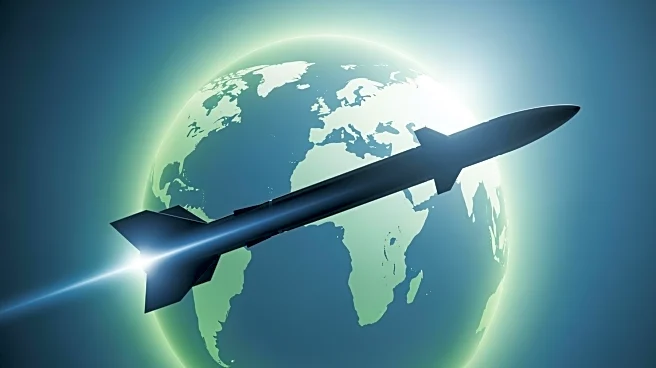What's Happening?
Russia has successfully tested a new nuclear-capable missile, the Burevestnik, as announced by President Vladimir Putin. The missile, which is part of Russia's nuclear triad, covered 14,000 kilometers
in a key test, spending 15 hours in the air. This development is part of Russia's ongoing nuclear strategy, which includes resisting Western pressure for a ceasefire in Ukraine and warning against Western military interventions. The Burevestnik, also known as Skyfall by NATO, is designed to evade existing missile defenses with its nuclear-powered engine, although its reliability has been questioned by Western experts. The missile's test follows a history of development challenges, including a 2019 explosion that resulted in fatalities and a brief spike in radioactivity.
Why It's Important?
The successful test of the Burevestnik missile signifies a significant advancement in Russia's military capabilities, potentially altering the global security landscape. The missile's ability to evade current missile defense systems poses a strategic challenge to the U.S. and NATO allies, potentially prompting a reevaluation of defense strategies and arms control agreements. The development of such advanced weaponry could escalate tensions between Russia and Western nations, particularly in the context of ongoing conflicts and geopolitical rivalries. Additionally, the environmental and safety concerns associated with nuclear-powered missiles could lead to international debates on the ethical implications of such technologies.
What's Next?
Following the successful test, Russia may proceed with further development and potential deployment of the Burevestnik missile. This could lead to increased military readiness and strategic posturing by Russia, as well as potential responses from NATO and other global powers. Diplomatic efforts may intensify to address the implications of this new missile capability, possibly influencing future arms control negotiations. The international community will likely monitor Russia's actions closely, considering the potential impact on global security and stability.
Beyond the Headlines
The development of the Burevestnik missile raises ethical and environmental concerns, given its nuclear-powered engine and the potential risks associated with its deployment. The historical context of nuclear-powered missile development during the Cold War, which was eventually abandoned due to safety concerns, highlights the potential dangers of such technology. The international community may need to address these issues through diplomatic channels and international agreements to prevent potential environmental disasters and ensure global security.









